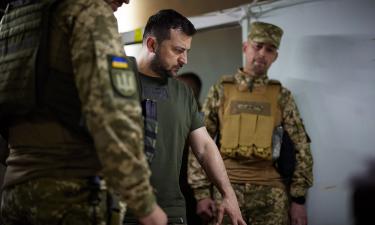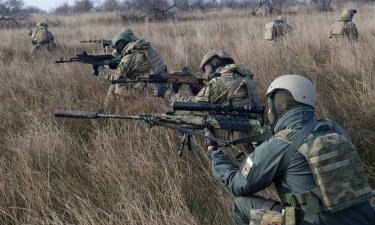Belarussian President Calls Russian Businessmen 'Swindlers'
Alexander Lukashenko is still an important political figure for Russia
It seems that there are only two odious statesmen on the territory that was called the USSR 12 years ago. They are Saparmurat Niyazov, the President of Turkmenistan, and Alexander Lukashenko, the President of Belarus.  The Turkmen president has not been of great interest in America and Europe, although Lukashenko has been attracting very much attention in the world lately. They call the Belarussian president "the last European dictator" - it is one of the softest epithets to characterize Alexander Lukashenko.
The Turkmen president has not been of great interest in America and Europe, although Lukashenko has been attracting very much attention in the world lately. They call the Belarussian president "the last European dictator" - it is one of the softest epithets to characterize Alexander Lukashenko.
Lukashenko does not seem to be a dictator. He used to be a cattle farm director, and he uses his past experience in his present activities. In fact, there is nothing bad about it - everyone is entitled to act according to their habits and peculiarities. One may not say that Lukashenko is a monster against the background of his neighbors from former Soviet states. Everything is simple about the Belarussian president, and his harsh treatment of his opponents is easy to explain: every other leader of an unsuccessful undertaking would do the same, if he were looking for someone to blame for all failures and mistakes. Alexander Lukashenko does not differ much form other politicians, he is just doing everything in straight lines.
European politicians have a negative attitude to the Belarussian president (it makes no difference to him), but the situation in Russia is totally different. In fact, there is no reason to praise Lukashenko on a regular basis, especially when it comes to Russian companies acquiring Belarussian enterprises. The latest scandal is connected with selling 49 percent of Beltransgaz's stocks to Gazprom. The deal has failed: Belarussians asked $4 billion for the stocks, which was not good for the Russian giant Gazprom. Lukashenko did not watch his language, as on many occasions before: "Swindlers will not get our property for a trifling sum. If you have no money, you don't walk around begging." In other words, Lukashenko wanted to say that he would not sell his fatherland for a cheap price, but he would not mind haggling.
The situation is a lot simpler, of course. If Russian companies buy up Belarussian enterprises, Lukashenko and his team will be deprived of the control over a very big part of the national economy. In this case, Lukashenko will lose the control over political procedures in Belarus too. It goes without saying that Alexander Lukashenko does not need that at all, because it was so hard for him to obtain the unlimited power. To all appearance, we will have a lot of chances to witness something like that happening in the future, taking into consideration the fact that Lukashenko does not exclude an opportunity to be reelected for the third time.
On the other hand, one should bear in mind the fact that Belarus remains Russia's only ally owing to Alexander Lukashenko's efforts. Yet, it seems that neither Moscow, nor Belarus realize the essence and goals of the union - they often imply completely different notions in the definition of the union. To crown it all, the process to build the Unified State of Russia and Belarus can be described as "neither good nor bad," although the state would be very good for the majority of both Russian and Belarussian citizens.
Finally, one may say it for sure: if the Belarussian president decides to resign, the idea of the Unified State will die. The process to build the state depends a lot on the political will of the Russian and Belarussian leaders, which means that the Kremlin will have to deal with Alexander Lukashenko either way, no matter if Moscow likes it or not.
Subscribe to Pravda.Ru Telegram channel, Facebook, RSS!




